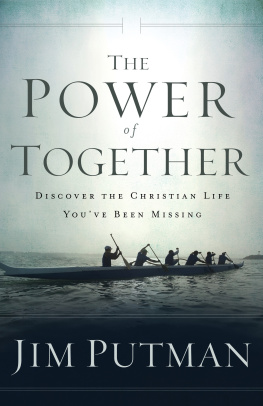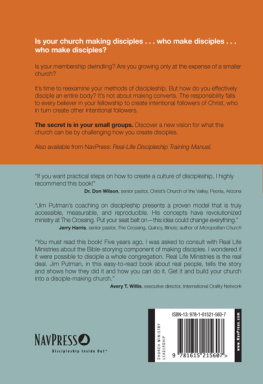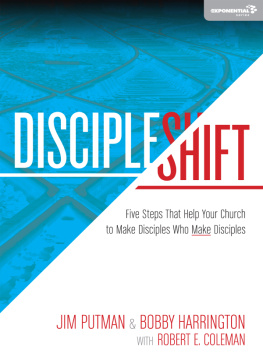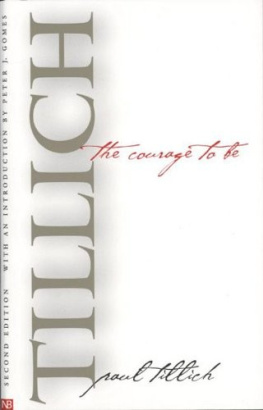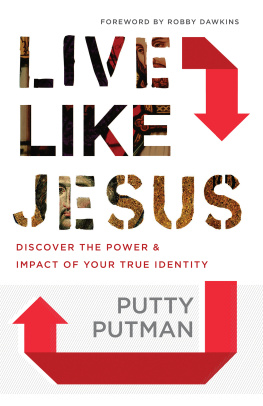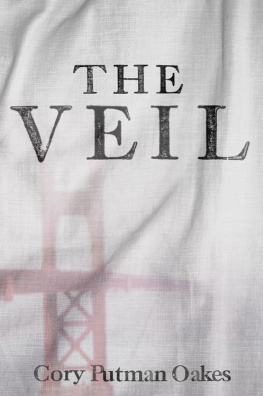Putman - Psychological Courage
Here you can read online Putman - Psychological Courage full text of the book (entire story) in english for free. Download pdf and epub, get meaning, cover and reviews about this ebook. City: Lanham;Md, year: 2004, publisher: University Press of America, genre: Politics. Description of the work, (preface) as well as reviews are available. Best literature library LitArk.com created for fans of good reading and offers a wide selection of genres:
Romance novel
Science fiction
Adventure
Detective
Science
History
Home and family
Prose
Art
Politics
Computer
Non-fiction
Religion
Business
Children
Humor
Choose a favorite category and find really read worthwhile books. Enjoy immersion in the world of imagination, feel the emotions of the characters or learn something new for yourself, make an fascinating discovery.

Psychological Courage: summary, description and annotation
We offer to read an annotation, description, summary or preface (depends on what the author of the book "Psychological Courage" wrote himself). If you haven't found the necessary information about the book — write in the comments, we will try to find it.
Psychological Courage — read online for free the complete book (whole text) full work
Below is the text of the book, divided by pages. System saving the place of the last page read, allows you to conveniently read the book "Psychological Courage" online for free, without having to search again every time where you left off. Put a bookmark, and you can go to the page where you finished reading at any time.
Font size:
Interval:
Bookmark:
Daniel Putman

Copyright 2004 by
University Press of America, Inc.
4501 Forbes Boulevard
Suite 200
Lanham, Maryland 20706
UPA Acquisitions Department (301) 459-3366
PO Box 317
Oxford
OX2 9RU, UK
All rights reserved
Printed in the United States of America
British Library Cataloging in Publication Information Available
Library of Congress Control Number: 2004100975
ISBN 0-7618-2820-6 (clothbound : alk. ppr.)
ISBN 978-0-7618-2821-1
 The paper used in this publication meets the minimum requirements of American National Standard for Information SciencesPermanence of Paper for Printed Library Materials, ANSI Z39.48-1992
The paper used in this publication meets the minimum requirements of American National Standard for Information SciencesPermanence of Paper for Printed Library Materials, ANSI Z39.48-1992
To my colleagues in the UW Colleges Philosophy Department and Marc Potash and Michael OBrien, all of whom helped me develop and sort through ideas in the book. And to Kathy Skubal, without whose practical help over the years this book would not exist.
In 1998, Timmy Stackpole of Ladder Company 103 tumbled through a collapsing floor in a burning building. He survivedjust barely. Over 30 percent of his body was burned; bone could be seen through melted flesh. I had big, big doubts he would make it, says Msgr. Thomas Brady, pastor of the Roman Catholic Church of the Good Shepherd, where Stackpole and his wife, Tara, were parishioners.
The father of five refused to give up. Two months later, he walked out of the hospital, still bandaged but wearing his trademark smile. This March, after a long rehab, he was back on the job at last.
Everything seemed perfect for Stackpole, Tara, and their kids, ages 6 to 18. He had recently earned a business degree and was promoted to captain a few weeks ago. But on September 11, the Stackpoles world was again shaken.
Tara, 37, was visiting her mother when she heard about the attack on the World Trade Center. I know hes there, she would tell Monsignor Brady later. Her hunch was right.
For a week, they clung to any flicker of light. If anybody could make it out, we knew Timmy could, said family friend Nancy Falco as she waited at Good Shepherd School last Tuesday to pick up her son and 10-year-old Brian Stackpole. Minutes later, Monsignor Brady would leave the rectory for Tara and Timmys little blue-and-white-shingled semidetached house on East 37th Street, in a working-class, Irish-Italian Catholic enclave in the shadow of Coney Island. He had news: Timmy, 42, had been found in the wreckage of the World Trade Center. They say firefighters from another unit found his body but stepped aside to let his New York City brethren pull him out.
By Thursday, daughter Kaitlins 15th birthday, everyone in the close-knit neighborhood knew. Visitors streamed in and out of the Stackpole house. There is great emptiness, says Falco. We held out hope until the very last minute. But Tara knows he did what he had to do. Hes one of the heroes of the 21 st century.
U.S. News & World Report, October 1, 2001
When he noticed that a white person had to stand, the bus driver, James F. Blake, called out to the four black people who were sitting just behind the white section. He said they would have to give up their seats for the new passenger. No one stood up. Youd better make it light on yourself and let me have those seats, the driver said threateningly. Three men got up and went to stand at the back of the bus. But Rosa Parks wasnt about to move. She had been in this situation before, and she had always given up her seat. She had always felt insulted by the experience. It meant that I didnt have a right to do anything but get on the bus, give them my fare and then be pushed around wherever they wanted me, she said.
By a quirk of fate, the driver of the bus on this December evening was the same James F. Blake who had once before removed the troublesome Rosa Parks from his bus for refusing to enter by the back door. That was a long time ago, in 1943. Rosa Parks didnt feel like being pushed around again. She told the driver that she wasnt in the white section and she wasnt going to move.
Blake knew the rules, though. He knew that the white section was wherever the driver said it was. If more white passengers got on the bus, he could stretch the white section to the back of the bus and make all the blacks stand. He shouted to Rosa Parks to move to the back of the bus. She wasnt impressed. She told him again that she wasnt moving. Everyone in the bus was silent, wondering what would happen next. Finally Blake told Rosa Parks that he would have her arrested for violating the racial segregation codes. In a firm but quiet voice, she told him that he could do what he wanted to do because she wasnt moving.
Rosa Parks by Kai Friese in The Book of Virtues,
edited by William Bennett, 290.
Jill is a 25-year-old single woman who works as a flight attendant for a major airline. After getting home late at night after a particularly difficult flight, Jill went out to a local convenience store and bought a half gallon of chocolate ice cream, a 1-pound box of cookies, a medium-sized frozen pizza, a loaf of French bread, and a quart of milk. When she got home, she put the pizza in the oven and waited impatiently for it to cook; everything else stayed on the table. When the pizza was just edible, she brought it out and placed it with the other food. She then lunged into the food and ate everything she bought as quickly as she could, stuffing in huge mouthfuls and dribbling milk, crumbs, and pizza sauce down her chin and on her blouse. When she finished, she ran to the bathroom, knelt in front of the toilet, thrust her hand down her throat, and vomited everything she had just eaten...
Before her appointment at the clinic, Jill read several articles about this disorder and was very relieved to find out that, as her internist had said, many other women suffered from these same odd symptoms. When her therapist asked her what brought her to the eating disorders clinic, she looked down and replied, I have bulimia.
Casebook in Abnormal Psychology, 3rd edition,
edited by John Vitkus, 24142.
The purpose of this book is to explore a particular kind of courage, what I call psychological courage. I want to support the idea that courage is a completely appropriate term for facing our inner fearsour phobias, bad habits, unhealthy psychological relationships. I also want to bring recognition to the millions of people who have had the strength of character to overcome psychological barriers to growth. In the last 100 years a medical understanding of the brain has helped relieve suffering for millions of people. Many conditions thought to be unsolvable can now be treated by appropriate drugs or forms of behavioral therapy. It is easy to lose sight of the difficult psychological decisions many people must make, sometimes on a daily basis. Despite the advances in medicine, people continue to go through powerful personal struggles with their own emotions and habits. They have to make difficult and painful choices that have far-reaching ethical implications for themselves, their loved ones, and those with whom they work. This book will examine those choices, especially the role of courage, in the light of modern psychology.
First, however, it is important to distinguish psychological courage from other types of courage. Two other types of courage have been discussed a great deal in history. Physical courage is overcoming a fear of death or physical harm. The goals of physical courage are traditionally defined by society or by the requirements of survival. A clear example is the courageous soldier who faces death in war or the firefighters who faced death to save innocent people in the World Trade Center. Another example would be bravely defending your family against a threat from nature such as a flood. In all these examples we admire the courage of the person because he or she chose to risk life for the sake of something greater or largercountry, family or the lives of other people.
Font size:
Interval:
Bookmark:
Similar books «Psychological Courage»
Look at similar books to Psychological Courage. We have selected literature similar in name and meaning in the hope of providing readers with more options to find new, interesting, not yet read works.
Discussion, reviews of the book Psychological Courage and just readers' own opinions. Leave your comments, write what you think about the work, its meaning or the main characters. Specify what exactly you liked and what you didn't like, and why you think so.


